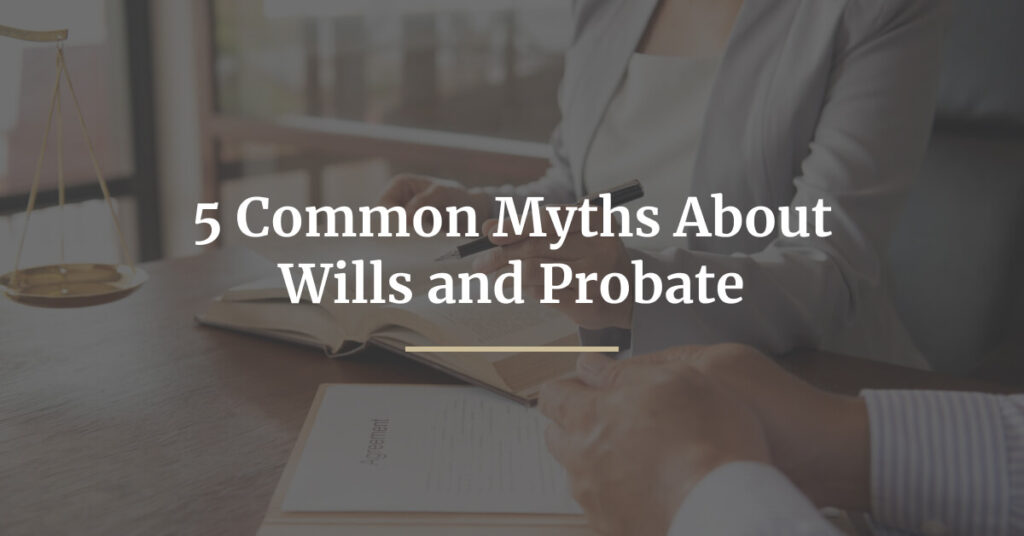5 Common Myths About Wills and Probate
In the realm of estate planning and administration in New South Wales, wills and probate are often subjects of misconceptions and misinformation. This guide aims to dispel some of the most common myths surrounding these critical legal processes. Understanding the truths behind these myths and misconceptions is essential for anyone navigating estate planning, ensuring assets are managed and distributed according to one’s wishes, and for those dealing with the affairs of a deceased estate.
Myth 1: If You Die Without a Will, the State Gets Everything
Contrary to popular belief, dying without a will (intestate) doesn’t mean the state inherits everything. In NSW, when a person dies intestate, their estate is distributed according to state law, typically to their closest relatives, such as a spouse, children, or parents. This process ensures that the deceased’s assets are passed on to family members, not automatically to the state.
Myth 2: Probate Is Always Required for Estate Administration
The necessity of probate depends on the specific circumstances of each estate. While probate, which is the court process to validate a will, is often required for larger or more complex estates, it’s not always mandatory. For instance, if the deceased’s assets were owned jointly with a right of survivorship or if assets like life insurance policies or superannuation have a nominated beneficiary, probate may be bypassed. Executors should assess the estate’s assets and consult with legal professionals to determine if probate is necessary.
Myth 3: Writing a Will Is Only for the Elderly or Wealthy
This myth ignores the importance of a will for individuals at any stage of life and of any financial status. In reality, drafting a will is a critical step for anyone who wishes to have a say in how their assets are distributed after their passing, regardless of their age or wealth. A will also allows individuals to appoint guardians for minor children, make specific bequests, and express their wishes for their funeral arrangements. Without a will, these decisions are left to state law, which might not align with the deceased’s personal preferences.
Myth 4: The Probate Process Will Take Years to Complete
The duration of the probate process varies greatly depending on the complexity of the estate, the clarity of the will, and the efficiency of the executor. While it’s true that some probate cases can be prolonged due to legal disputes or other complexities, many probate proceedings in NSW are relatively straightforward and can be completed within 9-12 months. The misconception that probate always takes years to complete often stems from a few high-profile, complicated cases. Executors and beneficiaries should be prepared for a process that might take some time, but it’s unlikely to stretch on for years in most standard cases.
Myth 5: The Executor Can Distribute Assets Immediately After Someone Dies
Executors have a legal responsibility to manage the deceased’s estate in accordance with the law and the terms of the will. However, they cannot distribute the estate’s assets immediately after the person dies. Before assets can be distributed, the executor needs to obtain probate (if required), ensure all debts and taxes are paid, and sometimes even resolve legal challenges. In NSW, there’s also a mandatory waiting period intended to allow creditors to make claims against the estate. Distributing assets too soon can lead to personal liability for the executor if it turns out there are outstanding debts or disputes over the will.
Conclusion
Understanding the truths behind common myths about wills and probate in NSW is vital for effective estate planning and administration. Misconceptions can lead to uninformed decisions, affecting how estates are managed and distributed. To ensure your estate planning aligns with your personal and financial circumstances, protecting your legacy and your loved ones’ interests, consider consulting with Empower Wills & Estate Lawyers for expert legal advice and guidance.
Liability limited by a scheme approved under Professional Standards Legislation.
Disclaimer: the information in this article relates to NSW law as at the date it was written and is general information only. It does not constitute legal advice and should not be relied upon as legal advice. It may contain information or links to sources which are no longer current. If you have a question or legal issue, we recommend you contact a lawyer and obtain legal advice that takes into account your specific facts, circumstances, needs and objectives.

